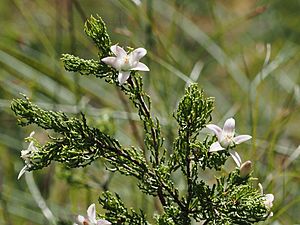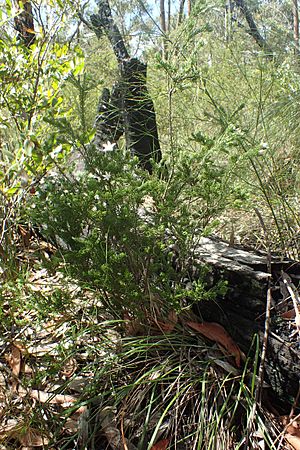Philotheca papillata facts for kids
Quick facts for kids Philotheca papillata |
|
|---|---|
 |
|
| Scientific classification | |
| Genus: |
Philotheca
|
| Species: |
papillata
|
Philotheca papillata is a type of flowering plant. It belongs to the Rutaceae family, which also includes citrus fruits. This plant is special because it only grows in a small area of New South Wales, Australia. It's a small, bushy plant with many stems. Its leaves have tiny bumps, and its flowers are white or pale pink. They grow one by one at the end of the stems.
Contents
Discovering Philotheca papillata
This plant was officially named Philotheca papillata in 2006. Two scientists, Ian Telford and Lachlan Copeland, described it. They found samples of the plant in 2004. This discovery happened in the Sherwood Nature Reserve, which is near a place called Glenreagh.
What Philotheca papillata Looks Like
Philotheca papillata is a small, upright shrub. It can grow up to about 60 centimeters tall. Its stems are covered with long, soft hairs.
Leaves of the Plant
The leaves of this plant are narrow and shaped like an oval. They are about 9 to 12 millimeters long and 1 to 1.5 millimeters wide. The leaves have small, bumpy glands on their underside. Each side of a leaf usually has four or five of these glands.
Flowers of the Plant
The flowers of Philotheca papillata are white or light pink. They grow one at a time at the very end of the stems. Each flower has five round parts called sepals, which are about 1.5 to 2 millimeters long. It also has five oval-shaped petals that are 7 to 10 millimeters long. Inside the flower, there are ten stamens, which are about 6.5 to 8 millimeters long. These stamens are joined together at their bottom half. This plant usually blooms in the spring.
Where Philotheca papillata Lives
This special plant grows in a type of open land called heath. It prefers to grow on sandy soil that comes from sandstone rocks. You can find Philotheca papillata in the Sherwood Nature Reserve, close to the town of Glenreagh in New South Wales.


